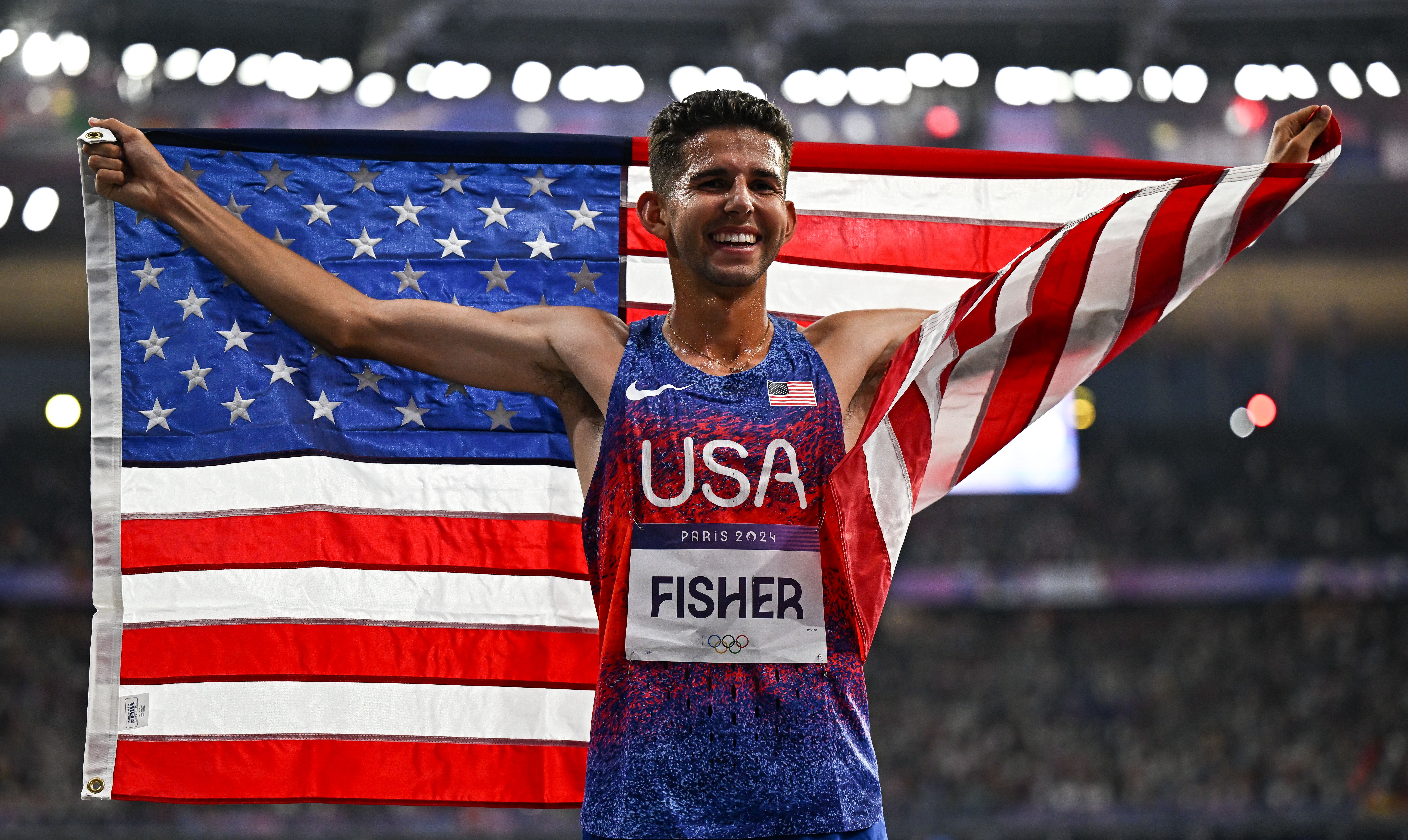The United States appears to be turning the page on the Olympic history of the 1500-meter run.
In unprecedented fashion, American Cole Hocker upset Tuesday's men's 1500-meter final with a blistering 3:27.65 time, taking gold in the event. And yet another surprise, American Yared Nuguse took home the event's bronze medal, solidifying two American medalists from the 1500-meter run. American Hobbs Kessler also took fifth in the race.
The United States hasn't finished with two runners on the podium (top three) in the 1500-meter run since 1912, when Americans Abel Kiviat and Norman Taber finished second and third, respectively, in the event.
Hocker, 23, became just the fourth American ever to win the Olympic 1500-meter run. The most recent American 1500-meter winner, USA's Matthew Centrowitz, ended a 108-year drought of gold for the United States in the event from his win during the 2016 Rio Olympics.
But Hocker's win --- from a racing standpoint --- was arguably more impressive.
Hocker was faced with an intensely competitive field. The 2020 Tokyo Olympic 1500-meter champion, Norwegian Jakob Ingebrigtsen, headlined the competition. The race also featured Great Britain's Josh Kerr, who took home bronze in the 2020 Olympics, and Kenya's Timothy Cheruiyot, who took silver in Tokyo.
Ingebrigtsen, 23, attempted to win the race from the start, forcing the rest of the field through a blistering ~54-second opening lap and ~1:51 through 800 meters. His plan appeared to be working, but the final 100 meters proved detrimental to his opportunity to become only the second person ever to repeat as 1500-meter Olympic champion.
The rest of the pack caught up to Ingebrigtsen as he appeared to tire out. Hocker attempted a Lane 1 pass on the inside of Ingebrigtsen, but was thwarted. Kerr then bolted on the outside. Hocker remained patient, somehow slipping through the inside of Ingebrigtsen and taking over Kerr with barely any real estate to spare.
Nuguse, 25, wheeled around Ingebrigtsen late, too, and snuck in the finish line for a bronze finish. He was .01 seconds away from overtaking Kerr for second place. Only once in Olympic history has the USA finished first and second in the 1500-meter run, dating back to the 1904 St. Louis Olympics.
Feeling out of the loop? We'll catch you up on the Chicago news you need to know. Sign up for the weekly> Chicago Catch-Up newsletter.
In Olympics past, the 1500-meter final has churned out tactical races, starting slow, then finishing fast. But the forceful speed of Ingebrigtsen's daring race plan yielded incredible times for the field.
Hocker's 3:27.65 time set a new Olympic record. Kerr's 3:27.79 finish set a Great Britain national record. Nuguse's 3:27.80 time is a personal best, as is Kessler's 3:29.45 for his career. The Netherlands' Niels Laros and Italy's Pietro Arese also set national records for their respective countries.
But the magnitude of both Hocker and Nuguse bringing USA medals from the event cannot be understated.
The 1500-meter run has been perennially dominated by African countries before Centrowitz's 2016 win. Between 1988 and 2012, Kenya won three gold medals, Algeria won two and Morocco won in 2004. Only one American brought home a medal from the event in that time frame (Leonel Manzano, silver, 2012 London Olympics).
And when Ingebrigtsen splashed onto the scene with an Olympic win in 2020 at just 19 years old, it appeared he would dominate for future Olympics to come. He was the heavy favorite to win the event coming into the 2024 Olympics.
But the USA turned the page on the event with Hocker and Nuguse stealing away medals. The 21-year-old Kessler also finished fifth, solidifying three Americans in the top five.
Tuesday's 1500-meter Olympic final marks three American medals from the past three Olympics in the 1500-meter run, and four medals in the last four Olympics. That's the same number of 1500-meter medals the United States collected between the 1920 and 2008 Olympics.
American distance running has traditionally been charted by the dominance of African countries in the Olympics. But if there was a time that the tides appeared to be turning in the USA's favor, it's never more than now.




